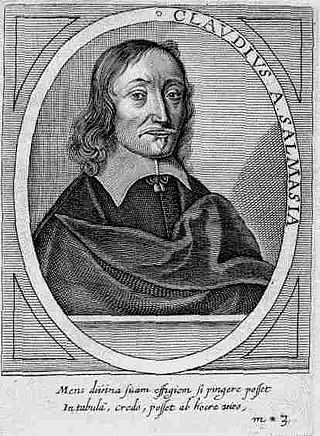Related Research Articles

John Milton was an English poet, polemicist, and civil servant. His 1667 epic poem Paradise Lost, written in blank verse and including twelve books, was written in a time of immense religious flux and political upheaval. It addressed the fall of man, including the temptation of Adam and Eve by the fallen angel Satan and God's expulsion of them from the Garden of Eden. Paradise Lost elevated Milton's reputation as one of history's greatest poets. He also served as a civil servant for the Commonwealth of England under its Council of State and later under Oliver Cromwell.
This article contains information about the literary events and publications of 1649.

Claude Saumaise, also known by the Latin name Claudius Salmasius, was a French classical scholar.

Areopagitica; A speech of Mr. John Milton for the Liberty of Unlicenc'd Printing, to the Parlament of England is a 1644 prose polemic by the English poet, scholar, and polemical author John Milton opposing licensing. Areopagitica is among history's most influential and impassioned philosophical defences of the principle of a right to freedom of speech and expression. Many of its expressed principles have formed the basis for modern justifications of that right.
John Phillips (1631–1706) was an English author, the brother of Edward Phillips, and a nephew of John Milton.

Sir Robert Filmer was an English political theorist who defended the divine right of kings. His best known work, Patriarcha, published posthumously in 1680, was the target of numerous Whig attempts at rebuttal, including Algernon Sidney's Discourses Concerning Government, James Tyrrell's Patriarcha Non Monarcha and John Locke's Two Treatises of Government. Filmer also wrote critiques of Thomas Hobbes, John Milton, Hugo Grotius and Aristotle.

John Bramhall, DD was an Archbishop of Armagh, and an Anglican theologian and apologist. He was a noted controversialist who doggedly defended the English Church from both Puritan and Roman Catholic accusations, as well as the materialism of Thomas Hobbes.

Alexander Morus (or Moir or More) (25 September 1616, Castres – 28 September 1670, Paris) was a Franco-Scottish Protestant preacher.
Anglo-Latin literature is literature from originally written in Latin and produced in England or other English-speaking parts of Britain and Ireland. It was written in Medieval Latin, which differs from the earlier Classical Latin and Late Latin.
Peter du Moulin (1601–1684) was a French-English Anglican clergyman, son of the Huguenot pastor Pierre du Moulin and brother of Lewis du Moulin. He was the anonymous author of Regii sanguinis clamor ad coelum adversus paricidas Anglicanos, published at The Hague in 1652, a royalist work defending Salmasius and including a strong attack on John Milton.

Eikonoklastes is a book by John Milton, published October 1649. In it he provides a justification for the execution of Charles I, which had taken place on 30 January 1649. The book's title is taken from the Greek, and means "Iconoclast" or "breaker of the icon", and refers to Eikon Basilike, a Royalist propaganda work. The translation of Eikon Basilike is "icon of the King"; it was published immediately after the execution. Milton's book is therefore usually seen as Parliamentarian propaganda, explicitly designed to counter the Royalist arguments.
Defension Secunda was a 1654 political tract by John Milton, a sequel to his Defensio pro Populo Anglicano. It is a defence of the Parliamentary regime, then controlled by Oliver Cromwell; and also defense of his own reputation against a royalist tract published under the name Salmasius in 1652, and other criticism lodged against him.

John Milton wrote poetry during the English Renaissance. He was born on 9 December 1608 to John and Sara Milton. Only three of their children survived infancy. Anne was the oldest, John was the middle child, and Christopher was the youngest.
Politics were an important part of John Milton's life. Milton enjoyed little wide-scale early success, either in prose or poetry, until the production of his later, controversial political works starting with The Tenure of Kings and Magistrates and Eikonoklastes.
The reception history of John Milton and his works has been a mixture of positive and negative responses, with his greatest influence being found within his poetry.
William Dugard, or Du Gard, was an English schoolmaster and printer. During the English Interregnum, he printed many important documents and propaganda, first in support of Charles I and later of Oliver Cromwell. He also proved a successful master at a number of schools, including the Merchant Taylor's School, Colchester Royal Grammar School and Stamford School, and wrote a number of non-fiction works.
"The Prevention of Literature" is an essay published in 1946 by the English author George Orwell. The essay is concerned with freedom of thought and expression, particularly in an environment where the prevailing orthodoxy in left-wing intellectual circles is in favour of the communism of the Soviet Union.
Popolo may refer to :
Nationality words link to articles with information on the nation's poetry or literature.
John Durel (1625–1683), John Durell, or Jean Durel, was a cleric from Jersey, known for his apologetical writing on behalf of the Church of England. He became Dean of Windsor in 1677. His French translation of the 1662 Book of Common Prayer was used frequently on the Channel Islands through to the 20th century and his 1670 Latin translation had been authorized by Convocation.
References
- ↑ Title so translated in John Alvis, ed., Areopagitica and Other Political Writings of John Milton, Indianapolis: Liberty Fund, 1999. ISBN 0-86597-197-8. p. 99.
- ↑ For examples of Milton's writings at this time being termed propaganda, see the "Life of John Milton" at luminarium.org ("For his propaganda writings, Milton had to go into hiding, for fear of retribution from the followers of King Charles II"); and R. Page Arnot's 1921 review of Leon Trotsky's Terrorism and Communism at marxists.org (where Arnot says "Trotsky achieves a miracle of compression and propaganda....For any parallel we have to go back to John Milton's 'Defensio pro Populo Anglicano'").
- ↑ Michael Bryson, "Background for the Defense of the English People," located here.
- ↑ Alvis, p. 264.
- ↑ See the section of Bryson's "Background", cited above, headed "Milton's Use of Invective in Defense of the English People" for examples.
- ↑ Alvis, pp. 253–4.
- ↑ The appraisal in the 1907 Nuttall Encyclopædia of General Knowledge is that Salmasius' defense "proved a failure, and provoked from Milton a crushing reply."
- ↑ Alvis, p. 98 (editor's introductory note).
- ↑ A. W. Ward & A. R. Waller, eds., Cambridge History of English and American Literature, Vol. VII, Section V (Milton), subsection 20 ("His Latin writings"). New York: G.P. Putnam's Sons; Cambridge, England: University Press, 1907–21. As given at Bartleby.com.
- ↑ Chisholm, Hugh, ed. (1911). . Encyclopædia Britannica . Vol. 24 (11th ed.). Cambridge University Press. p. 81.
- ↑ Barbara K. Lewalski, The Life of John Milton, [multiple cities]: Blackwell Publishing, 2000, ISBN 978-0-631-17665-7. pp. 258–9.
